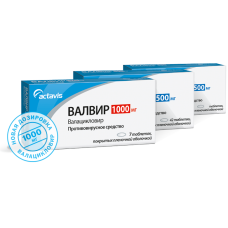Expiration date: 03/2026
Active substance: Valacyclovir
Composition
1 tablet film coating contains: active substance: valacyclovir hydrochloride hydrate 611.70 mg corresponding to 500 mg valacyclovir, auxiliary substances, film coating - detailed information, see the instructions.
Pharmachologic effect
In humans, valacyclovir is rapidly and completely converted to acyclovir and L -valine exposed valatsiklovirgidrolazy.
in vitro Acyclovir has a specific inhibitory activity against viruses: Herpes simplex types 1 and 2, Varicellazoster, Epstein-Barr virus, cytomegalovirus (CMV), human herpes virus type 6
Acyclovir inhibits viral deoxyribonucleic acid (DNA) immediately after phosphorylation and conversion to the active form of acyclovir triphosphate. Acyclovir triphosphate competitively inhibits viral DNA polymerase, and a nucleoside analogue having, incorporated into viral DNA, which leads to a complete break and chain termination of DNA synthesis (and therefore to block replication of the virus).
Testimony
Treatment of herpes zoster,
Treatment and prevention of recurrence of infections of the skin and mucous membranes caused by the herpes simplex virus (including first identified and recurrent genital herpes)
Treatment of herpes labialis,
Reduction of infection with genital herpes healthy partner, if taken as suppressive therapy in combination with safer sex,
Prevention of CMV infection occurring in organ transplantation (reduces the severity of acute graft rejection reactions in patients with kidney transplants, the development of opportunistic infections and other viral infections caused by viruses and H.simplex V.zoster) in adults and children older than 12 years.
Contraindications
- Hypersensitivity to valacyclovir, acyclovir, and other components of the drug,
- Clinically expressed form of HIV infection when the content of CD4 + lymphocytes below 100 / uL,
- Bone marrow transplantation,
- Kidney transplantation
- Children's age (up to 12 years with CMV, and 18 years - for other indications).
Precautions: hepatic impairment (high dose), renal failure, pregnancy, lactation.
Dosing and Administration
Inside. Adults.
Shingles - 1000 mg 3 times daily for 7 days.
Herpes simplex - 500 mg 2 times a day. In the case of relapse rate should be 3 or 5 days. The first episode with severe treatment duration can be increased to 10 days (in relapsed ideal appoint Valvira in the prodromal period or when the first symptoms of the disease, ie, tingling, itching, burning).
For the treatment of herpes labialis effective use of the drug at a dose of 2 g, 2 times in 1 day: The second dose should be taken approximately 12 hours (but not earlier than 6 h) after the first dose (do not use this dosing regimen for more than 1 day, since, as shown, this does not provide additional clinical benefit). Relapse prevention of infections caused by the herpes simplex virus: patients with preserved immune - 500 mg 1 time per day, with very frequent recurrences (more than 10 per year) - 250 mg 2 times a day for adult patients with immunodeficiency - 500 mg 2 times a day. Duration of the course - 4-12 months.
Infection prevention genital herpes healthy partner: infected heterosexual adults with preserved immunity and the number of exacerbations and 9 year - 500 mg 1 time per day for 1 year or more, each day at a regular sexual life, with irregular sexual contact reception Valvira necessary starting 3 days before the alleged sexual contact (data about the prevention of infection in other populations of patients with absent). Prevention of cytomegalovirus infection: Adults and adolescents over 12 years - 2 g 4 times a day (as soon as possible after transplantation). Course duration - 90 days, but in patients with a high risk of treatment may be longer.
Side effects
The most frequently occurring adverse reactions with the use of valaciclovir headache and nausea, more serious side effects: thrombotic thrombocytopenic purpura / hemolytic uremic syndrome, acute renal failure and neurological disorders.
Adverse reactions are listed below in accordance with the classification by major systems and organs, and the frequency of occurrence: very common - ? 1/10, often - ?1 / 100 and <1 ,, = "" 10 = "" 1000 = "" 100 = "" 10000 = "" p = "">,
From the digestive tract: often - nausea, rarely - abdominal discomfort, including abdominal pain, vomiting, diarrhea, very rare, reversible disturbances of liver function tests, which are sometimes regarded as a manifestation of hepatitis.
From the blood and lymphatic system: very rarely - leukopenia (mainly in patients with lowered immunity), thrombocytopenia.
Immune system: very rare - anaphylaxis.
Mental disorders and disorders of the nervous system: often - headache, sometimes - agitation including aggressive behavior, rare dizziness, confusion, hallucinations, decreased mental ability, very rarely - excitement, tremors, ataxia, dysarthria, psychotic symptoms, including mania, depression, convulsions, encephalopathy, coma. These symptoms are reversible and usually seen in patients with impaired renal function or in comparison with other diseases. Patients with organ transplant, receiving high doses of valaciclovir (8 g / day) for the prevention of CMV infections, neurological reactions occur more frequently than when lower doses.
On the part of the respiratory organs and mediastinum: occasionally - dyspnea.
Skin and subcutaneous tissue: inogda- rashes, including symptoms of photosensitivity, rarely - itching.
Allergic reactions: very rarely - urticaria, angioedema.
From the urinary system: renal dysfunction rare, very rare acute renal failure, renal colic (it may be associated with renal dysfunction).
Other: patients with severely impaired immune system, especially in patients with an advanced stage of syndrome acquired immune deficiency receiving high doses of valaciclovir (8 g / day) for a long time, the cases of renal failure was observed, microangiopathic hemolytic anemia and thrombocytopenia (sometimes in combination ). These complications have been observed in patients with the same disease but not receiving valacyclovir.
Set the frequency of symptoms of some adverse reactions from the available data is not possible.
From the senses: blurred vision.
From the side of hematopoiesis: neutropenia, aplastic anemia, leykoplastichesky vasculitis, thrombotic thrombocytopenic purpura.
For the skin: erythema multiforme.
Laboratory indicators: reduction of hemoglobin, hypercreatininemia.
Other: dysmenorrhea, arthralgia, nasopharyngitis, respiratory tract infections, facial swelling, high blood pressure, tachycardia, fatigue, further children -lihoradka, dehydration, rhinorrhea.
Special instructions
Acceptance of the drug in high doses for a long time for conditions involving severe immunodeficiency (bone marrow transplantation, clinically expressed form of HIV infection, a kidney transplant), have led to the development of thrombocytopenic purpura and hemolytic uremic syndrome, or death. If you have any side effects on the central nervous system (including agitation, hallucinations, confusion, delirium, seizures, and encephalopathy) drug overturned.
Patients with risk of dehydration, especially in elderly patients, in the period of treatment Valvira necessary to ensure adequate hydration of the body. In patients with renal failure has increased risk of neurological complications.
If abnormal liver function in patients with mild or moderate cirrhosis (hepatic synthetic function maintained) dose adjustment Valvira preparation is required. In the study of the pharmacokinetics in patients with severe hepatic cirrhosis (in violation of the synthetic function of the liver and the presence of shunts between the portal system and general vascular bed) and had obtained no evidence indicating the need to correct dosing regime, however, clinical experience with the drug Valvira in this category is organic patients. No data on the use Valvira drug in high doses (4 g / and more) in patients with liver disease, so caution should be prescribed the drug in high doses in this category of patients.
Patients older dose adjustment is required, except in cases of significant renal dysfunction. It is necessary to maintain an adequate fluid and electrolyte balance.
Special studies on the effect of the drug in patients Valvira been conducted in liver transplantation. However, it has been shown that prophylactic administration of high doses of acyclovir reduces CMV infection. Suppressive therapy with Valvira reduces the risk of transmission of genital herpes, but do not eliminate it completely and does not lead to a complete cure. During therapy with Valvirpatsient should take measures to ensure the security of the partner during sexual intercourse.
Drug interactions
Clinically significant interactions have not been established.
Cimetidine and probenecid after taking 1 g valaciclovir increases the AUC of acyclovir by reducing its renal clearance (however correct dose of valaciclovir is not required because of the wide therapeutic index of aciclovir).
Care must be taken in the event of simultaneous use of valacyclovir in high doses (4 g /) and drugs which compete with aciclovir for elimination pathway (the latter is eliminated in the urine in unchanged form as a result of active tubular secretion), since there is a potential threat increase in plasma levels one or both drugs or their metabolites. With simultaneous use of acyclovir with mycophenolate mofetil have been observed increase in AUC of the first and second inactive metabolite.
It should also be taken in combination with high doses of valaciclovir (4 g / above) with drugs that affect renal function (e.g. cyclosporin, tacrolimus).
Overdose
Currently overdose valacyclovir insufficient data.
Symptoms: A single dose of acyclovir overdose of up to 20 g, which is partly absorbed from the gastrointestinal tract, was not accompanied by toxic effects of the drug. When administered within a few days of ultra-high doses of acyclovir developed nausea, vomiting, headache, confusion, with a / in the introduction - increase in the concentration of serum creatinine, renal failure, confusion, hallucinations, agitation, convulsions, coma.
Treatment: Patients should be under close medical supervision to detect signs of toxic effects. Haemodialysis significantly enhances the removal of aciclovir from the blood and can be considered the treatment of choice in the management of patients with an overdose of valacyclovir.
Storage conditions
The temperature is not above 30 ° C. Keep out of the reach of children!






